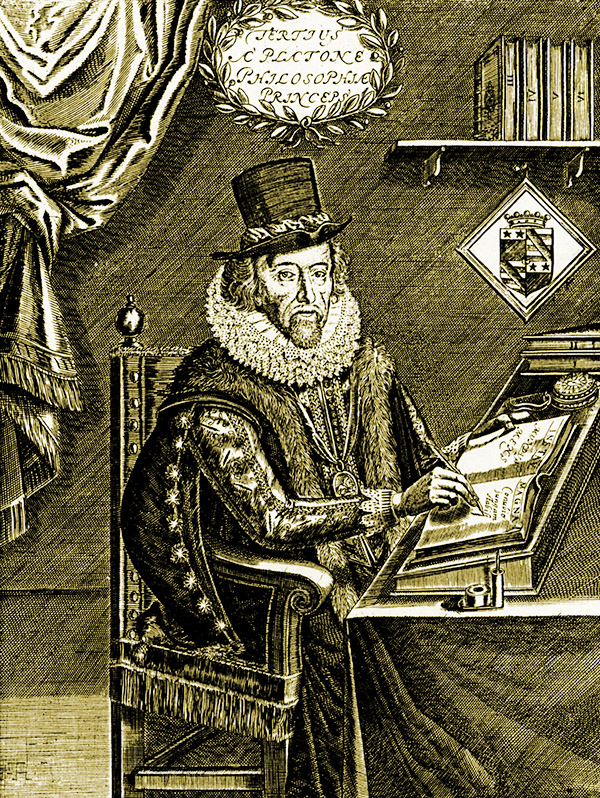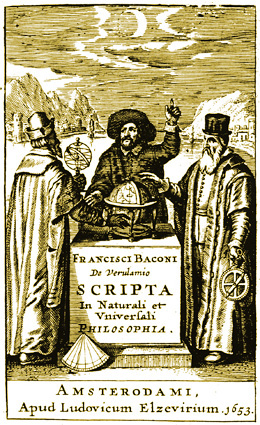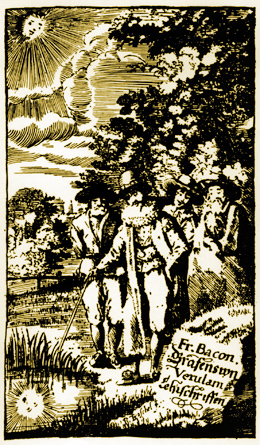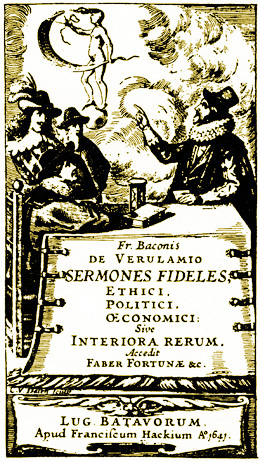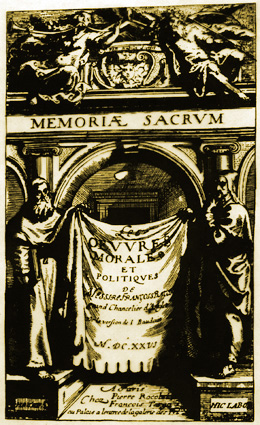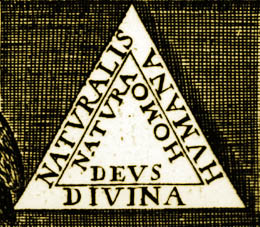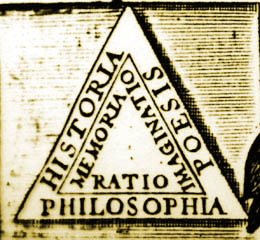Baconian Philosophy
“So certainly, if a man's mind be truly inflamed with charity, it doth work him suddenly into a greater perfection than all the doctrine of morality can do, which is but a sophist in comparison of the other.”
Francis Bacon: Advancement of Learning, Bk II – 1605
Philosophy, a word said to have originated with Pythagoras, means the love of wisdom (Sophia), and the philosopher is a lover of wisdom. The purpose of philosophy is to understand and eventually know the wisdom. How do we do this? The clue is already given us, embodied in the very word itself and handed down in the Orphic-Pythagorean-Platonic-Christian wisdom tradition, and this is that wisdom is essentially love, and divine wisdom is divine love. Therefore, in order to know this wisdom, we need to love, which means experiencing love by being both loving and receptive to love. But it would appear that there is an infinite variety of possible love relationships and activities, and therefore an infinite number of types of love and ways of loving. To know how to love perfectly in each and every situation would be the fulfilment of philosophy.
Francis Bacon took this seriously. He was a philosopher in the true sense of the word, and was referred to as “The Third (after) Plato”. 1 He describes Philosophy as the handmaiden, and Divinity as the mistress whom the handmaiden serves. The mistress he refers to is Sophia, the Divine Wisdom. He further points out that the aim of the handmaiden is to know the will of her mistress, so as the better to serve the mistress.
And if it be said, that the cure of men's minds belongeth to Sacred Divinity, it is most true: but yet Moral Philosophy may be preferred unto her as a wise servant and humble handmaid. For as the Psalm saith, that the eyes of the handmaid look perpetually towards the mistress, 2 and yet no doubt many things are left to the discretion of the handmaid, to discern of the mistress's will; so ought Moral Philosophy to give constant attention to the doctrines of Divinity, and yet so as it may yield of herself, within due limits, many sound and profitable directions. 3
The philosophical argument that goes with this is that since God, or Sophia, is Love, and God’s will is to express love, or love in action (as Bacon explains elsewhere), therefore the greatest service a philosopher can render is to do likewise; and this, Bacon explains, is goodness, charity or philanthropy. In other words, by serving others charitably, we serve the Divine Wisdom, which is Love. This is another way of describing the ‘Two Great Commandments’ which, as explained by Jesus Christ, summarise the whole law of God on which all else depends:-
‘Thou shalt love the Lord thy God with all thy heart, and with all thy soul, and with all thy mind.’ This is the greatest and the first commandment. And the second is like it, 'Thou shalt love thy neighbour as thyself.' On these two commandments depend the whole Law and the Prophets. 4
What Bacon says about this is powerful and challenging, but this is the essence of his philosophy:-
To conclude therefore, let no man upon a weak conceit of sobriety or an ill-applied moderation think or maintain, that a man can search too far, or be too well studied in the Book of God's Word, or in the Book of God's Works—Divinity or Philosophy. But rather, let men endeavour an endless progress or proficience in both; only let men beware that they apply both to charity, and not to swelling [pride]; to use and not to ostentation; and again that they do not unwisely mingle or confound those learnings together. 5
I take Goodness in this sense, the affecting of the weal of men, which is that the Grecians call Philanthropia; and the word humanity (as it is used) is a little too light to express it. Goodness I call the habit, and Goodness of Nature the inclination. This of all virtues and dignities of the mind is the greatest; being the character of the Deity: and without it man is a busy, mischievous, wretched thing; no better than a kind of vermin. Goodness answers to the theological virtue Charity, and admits no excess, but error. The desire of power in excess caused the angels to fall; the desire of knowledge in excess caused man to fall; but in charity there is no excess; neither can angel or man come in danger by it. 6
In sum, I would advise all in general, that they would take into serious consideration the true and genuine ends of knowledge; that they seek it not either for pleasure, or contention, or contempt of others, or for profit, or fame, or for honour and promotion, or such like adulterate or inferior ends; but for the merit and emolument of life; and that they regulate and perfect the same in charity. 7
What Bacon calls “Divinity” is the “Book of God’s Word” – the wisdom (Word) given to us via the prophets or inspired directly into the human heart. This wisdom is divine knowledge, or inspired knowledge, referred to as wisdom so as to differentiate it from human knowledge. What Bacon calls “Philosophy” is the “Book of God’s Works” – knowledge of God’s Creation, which is human knowledge. Using another metaphor, Bacon describes inspired knowledge (Divinity) as descending from above like rain and human knowledge (Philosophy) as springing up from beneath like a fountain:-
The knowledge of man is as the waters, some descending from above, and some springing from beneath; the one informed by the light of nature, the other inspired by divine revelation. The light of nature consisteth in the notions of the mind and the reports of the senses... So then, according to these two differing illuminations or originals, knowledge is first of all divided into Divinity and Philosophy. 8
Bacon sees Philosophy as essentially being composed of three types of human knowledge—knowledge of God, knowledge of the human being and knowledge of the natural world—which he refers to as Divine Philosophy, Human Philosophy and Natural Philosophy:-
In Philosophy, the contemplations of man do either penetrate unto God, or are circumferred to Nature, or are reflected and reverted upon himself. Out of which several inquiries there do arise three knowledges, Divine Philosophy, Natural Philosophy, and Human Philosophy or Humanity. For all things are marked and stamped with this triple character of the power of God, the difference of Nature and the use of Man. 9
Like Socrates, Bacon advocated the inductive procedure of experimentation for the discovery of laws, and this he earnestly promoted, but not to the extent of denying the use of inspiration, intuition, imagination, speculation and deduction, all of which he saw as necessary or valuable parts of the process. Before Bacon, very little in terms of induction had been done in the mainstream of philosophy and academia, 10 and this Bacon saw as a distinct weakness that had resulted in much empty speculation and wrong conclusions, with little achieved either for the benefit of mankind or for the better understanding and worship of God.
Largely thanks to Francis Bacon and his ideas, modern science was founded, in which the inductive procedure is a vital component. But what has so far been largely left out in modern science is the study of the metaphysics of life and the all-important love-link with and service to Divinity, the divine Wisdom.
With regard to metaphysics, although Bacon saw the study of this as being far more important than physics, yet he promoted the investigation of physical nature first, as being the necessary groundwork to be done before we could safely rise higher to study the metaphysical levels: otherwise we might simply build ‘castles in the air’. He also veiled his own researches into and knowledge of metaphysics, reserving them for a select group of successors and for those “who could pierce the veil”.
Besides symbolising Divinity and Philosophy as ‘Books’, Bacon also refers to them as the Pyramid of Divinity and Pyramid of Philosophy, and relates them to the Great Pillars that stand before the entrance to Solomon’s Temple. In this he is inferring the Gemini myth of the two brothers, one immortal and the other mortal, who love each other dearly and go on adventures together, with the immortal raising the mortal one to eternal life when the latter dies. This resurrection is a reference to revelation, illumination or full knowledge of truth, symbolised as the capstone of the pyramid, which itself is represented symbolically as an all-seeing eye in glory. Also inferred is the parallel myth of Venus and Adonis, the immortal goddess and mortal man, which is analogous to that of Sophia and the philosopher. In this light, for instance, the Shakespeare poem Venus and Adonis can be seen as a metaphor for the state of Philosophy (Science) as it then was and still is to some extent, and therefore how it might become if Adonis (the philosopher/scientist) were to make better choices (i.e. love Venus).
Bacon sees this whole process as building a temple in the mind (soul) of mankind:-
I am not raising a capitol or pyramid to the pride of man, but laying a foundation in the human understanding for a holy temple after the model of the world. That model therefore I follow. For whatever deserves to exist deserves also to be known, for knowledge is the image of existence; and things mean and splendid exist alike. 11
The other thing that is still left out of a large part of modern science, from a Baconian point of view, is the charitable or philanthropic aspect. However, Bacon foresaw that his philosophy or science would probably always be one that developed alongside but separately to mainstream (or mundane) science. There is an obvious reason for this, which is that anyone committed to Bacon’s form of philosophy or science would be an initiate—that is to say, someone who has stepped from a mundane to a virtuous cycle of life, dedicating his or her life to doing good in unselfish and loving ways, and thereby helping to make the world a better place for all.
The ultimate goal that Bacon has in mind is that the world should once again enjoy a paradisiacal golden age, as it once had during the golden age of Atlantis. Only love, friendship and philanthropic activity, coupled with a better understanding and knowledge of the summary law and divine wisdom, can bring this about. Bacon’s utopian work, The New Atlantis, sets out this theme in an allegorical way. In this, Bacon represents himself as Solamona, in the sense of being Solomon II, a philosopher-king, the founder of Solomon’s House in which the Six Days’ Work (the Great Instauration) is carried out.
The word ‘Instauration’ is derived from Latin ‘instauratio’, meaning (1) repair, renewal, restoration; (2) an act of founding or establishing something. It is famously used in the Latin Vulgate Bible where it refers to the repair, restoration and/or rebuilding of Solomon’s Temple (1) in the reign of King Joash of Judah in the 9th century BC, (2) in the reign of King Josiah of Judah in the 7th century BC, and (3) in the time of Zerubbabel, who led the first group of Jews from captivity in Babylon and back to Jerusalem in the first year of Cyrus, King of Persia, in the 6th century BC. For Bacon, it is the second and third events (and particularly the third) that fits his meaning, when the Ark of the Covenant was rediscovered and “brought to light” during the rebuilding of the ruined temple. The word also refers to spiritual edification or illumination, wherein Solomon’s Temple signifies the temple of light that is the illumined human mind or soul, including humanity’s collective world soul.
The alternative title “The Six Days Work” is derived from the Six Days of Creation referred to in the first chapter of Genesis in the Bible, which culminate in the Seventh Day of Rest (or Peace). The whole of Bacon’s Great Instauration is patterned on his cabalistic understanding of this six-stage act of creation, which culminates in the Sabbath of illumination and joy. The aim of the work, which has six stages in its creative process, is to create on earth a Golden Age of Peace—the Seventh Day ‘Sabbath’. Bacon’s description and example of the six creative stages is outlined in what he calls the six books of the Great Instauration. The seventh book lies hidden, as also does the fourth book, but it is possible to find them.
Poetry lies at the heart of Bacon’s new method and the building of the Pyramid of Philosophy, which he described as composed of three main things: History, Poesie (Poetry) and Philosophy. History forms the foundation of the pyramid, Philosophy the superstructure. Poetry is that which lifts our thoughts from the physical to the metaphysical, from the mundane to the spiritual:-
....so as it appeareth that poesy serveth and conferreth to magnanimity, morality, and to delectation. And therefore it was ever thought to have some participation of divineness, because it doth raise and erect the mind, by submitting the shows of things to the desires of the mind; whereas reason doth buckle and bow the mind into the nature of things. 12
Poetry is associated by Bacon with imagination, one of the three principal faculties of the human soul, without which we would be unable to conceive of anything:-
That is the truest Partition of human Learning, which hath reference to the three Faculties of man’s soul, which is the seat of learning. History is referred to Memory, Poesie to the Imagination, Philosophy to Reason. 13
Bacon describes imagination as being the agent or messenger (nuncius) by means of which what is acquired via the senses is presented to the rational mind, to be thought on; and then again it is the agent by means of which the decision to put a thought into action is conveyed into action:-
It is true that the Imagination is an agent or nuncius in both provinces, both the judicial and the ministerial. For Sense sendeth over to Imagination before Reason hath judged: and Reason sendeth over to Imagination before the decree can be acted: for Imagination preceedeth Voluntary Motion. Saving that this Janus of Imagination hath differing faces: for the face towards Reason hath the print of Truth, but the face towards Action hath the print of Good; which nevertheless are faces. 14
All in all, Bacon’s greatest gift to the world, as he saw it, is his Art of Discovery. By careful analysis and following the clues that he gives, it is possible to discover that Bacon’s Art of Discovery is a method of discovering all things and building a golden age on earth by means of poetry and the arts. In other words Bacon, who was pre-eminently a poet and an artist, saw Creation—the universe and all nature—as a living work of art, with God as the poet-artist. Since mankind is made in the likeness of God, Bacon reasoned, we should therefore imagine and act like God. As God is the great poet and artist, then we should also be poets and artists in all that we create. As God is all love, then we should do so in loving ways.
Bacon’s great gift to the world was his ability not only to see the promised Golden Age as a work of art but also to both devise and inaugurate a particular method using the arts by which it might be more certainly achieved. He referred to his new method as the Art of Discovery, and conceived the Great Instauration as being comprised of six stages of work leading to a final seventh stage of peace, illumination and joy—the state of paradise, the state of a golden age. The creation or building of this golden age is a work of art—a poetic, artistic work of the imagination, with good science and technology, laws and culture. To understand this is to understand Bacon and what he is trying to teach us and encourage us to do.
Whereas the second stage of the Great Instauration concerns the New Organon or Method, the fourth stage is the application of this method, by means of which we raise the history of facts and observations concerning the nature of nature, the nature of humanity and the nature of divinity to the mind so that they might be seen as if in a frame. From what we see we can then deduce some idea of the laws behind those natures, and from that create new experiments by putting what we understand into action; and then repeat the process until we eventually perfect the experiments and discover the real truth—the higher laws or even the summary law of life. Besides the New Organon or Art of Discovery, Bacon refers to this fourth stage or part of the Great Instauration as the Ladder of the Intellect, so the climbing of this ladder, as in the initiatory process and as artists, is the operation of his Art of Discovery.
From the illustrations Bacon provides, we can deduce that Bacon is suggesting, for Part 4 of the Great Instauration, (1) imaginative stories or scenarios for use in investigating the nature of nature, (2) plays for use in investigating the nature of humanity, and (3) initiatic ceremonies for use in investigating the nature of divinity. At the same time it should be noted that each of these includes something of the other two. As examples, Bacon refers to laboratories and such like for use in investigating the nature of nature, and has provided the Shakespeare plays for use in investigating the nature of humanity. For investigating the nature of divinity, it would appear that he instaurated Freemasonry, reforming what already existed and transmuting it into modern speculative Freemasonry, dedicated to charity. Our task is to gather knowledge from what has been accomplished, experienced and understood by our predecessors and by ourselves, and repeat—or, rather, instaurate—the process, raising everything poetically and artistically to a yet higher level of operation and understanding, step by step, or degree by degree.
© Peter Dawkins, FBRT (rev1, 22/09/2017)
1. Depicted on the titlepage of the 1640 Advancement of Learning.
2. Psalm 123: 2
3. Francis Bacon, Advancement of Learning, Bk II (1605).
4. Matthew 22:35-40.
5. Francis Bacon, Advancement of Learning, Bk I (1605).
6. Francis Bacon, ‘Of Goodness and Goodness of Nature,’ Essays (1625).
7. Francis Bacon, The Preface, Advancement of Learning (1640).
8. Francis Bacon, Advancement of Learning (1605), Bk II (1605).
9. Francis Bacon, Advancement of Learning, Bk II (1605)
10. One of the few examples of an academy devoted to the inductive method that preceded Francis Bacon's method and had a powerful influence on him was Bernard Palissy’s ‘Petite Academie’ in Paris, the subject of L'Academie Francoise (translated into English as The French Academy), which Bacon's 'Knights of the Helmet' were required to read (Gesta Grayorum 1594). See FBRT essay The French Academy by Peter Dawkins.
See also:-
-
Dana Jalobeanu, Natural history and the medicine of the mind: the roots of Francis Bacon`s Great Instauration. Annals of the University of Bucharest - Philosophy Series, [S.l.], v. 61, n. 1, june 2015. ISSN 0068-3175. Available at: <http://annals.ub-filosofie.ro/index.php/annals/article/view/107>.
-
Henry Morley, The Life of Bernard Palissey, of Saintes: His Labors and Discoveries in Art and Science, Vol. II, p.90 (Boston: Ticknor, Reed & Fields, 1853). Available at: <https://archive.org/details/lifebernardpali00morlgoog>.
-
Pierre de la Primaudaye, The French Academie (1586). Download available from abebooks.com.
11. Francis Bacon, Novum Organum, Bk I, Aph.120 (transl. Spedding & Ellis).
12. Francis Bacon, Advancement of Learning, Bk II (1605).
13. Francis Bacon, Advancement of Learning, III, i (1640).
14. Francis Bacon, Advancement of Learning, Bk II (1605).
